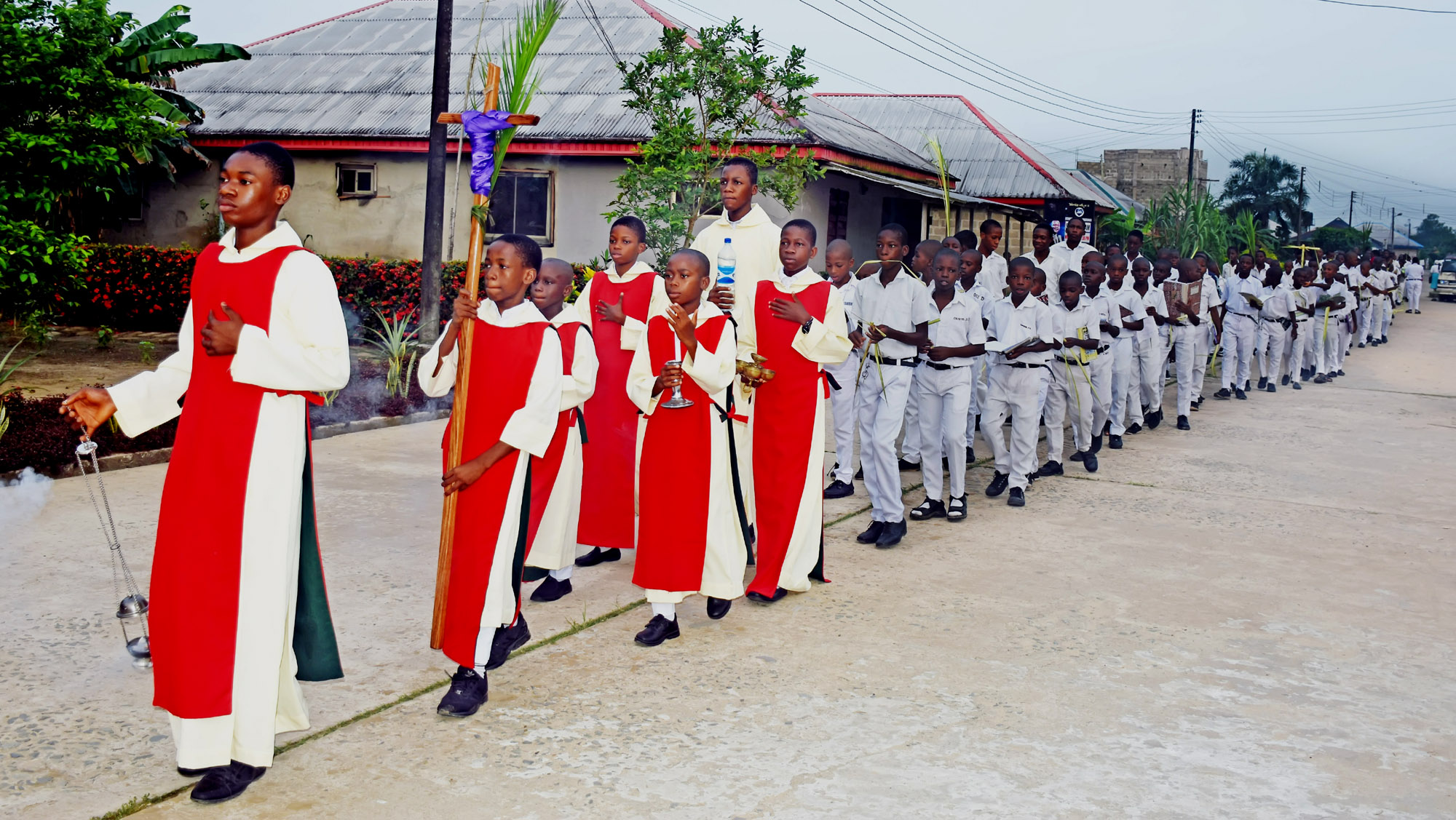Editorial
Easter Amid Covid-19

Christians in Nigeria and their counterparts in Christendom are celebrating Easter in observance of the death, burial and resurrection of Jesus Christ. Easter is a huge annual occasion for Christians worldwide, marking the end of 40 days of fasting, sacrifice, self-discipline, repentance, the forgiveness of sins and salvation called the Lenten Season.
Indeed, this year’s observance gives Nigerian Christians yet another opportunity to reflect on the nitty-gritty of these far-famed events upon which the Christian religion and practice are hinged and how those episodes can renew their faith in Jesus Christ. Though he taught many lessons through his parables and miracles, the greatest lessons Jesus taught were those of his own life of humility, service and self-sacrifice.
Easter is an occasion for Christians and all men and women of goodwill everywhere to reflect on the paradoxical truth of humanity that it is in giving away we truly receive; it is in dying that we are truly born; and that victory belongs to the meek and humble, not to the oppressor whose power is only transient and ephemeral.
Amidst a season of hysteria and considerable misery as well as the breakdown of social morality in addition to the exacerbating economic fortunes of the overwhelming majority of the people, Nigerian Christians are today asserting the miracle of the death and resurrection of Jesus Christ.
Nigerians have apparently been subjected to extensive socio-economic stress largely on account of tremendous corruption of the political elite. It is regrettable that many of the players in the profligate system are professed Christians who fail to demonstrate Christian mores; rather, they promote the frantic looting of the national treasury.
In the face of the Easter celebrations, it is believed that Christians in Nigeria would reminisce the pains Jesus put up with on the Cross on Good Friday and abstain from avoidable evil inimical to the promotion of mutual co-existence, unity, peace and stability of the country.
In reality, in this moment of terrorism, banditry, kidnapping, armed robbery, gangsterism, cultism, economic and financial crimes and the current Coronavirus (COVID-19) pandemic haunting Nigeria lately, Easter offers full-size opportunities for Nigerians to reconcile themselves with God and man.
Easter festivals begin on Good Friday when Christ, according to the Scriptures, was crucified and ends on Sunday when He rose from the dead in fulfilment of biblical injunctions. As Christians observe this fiesta, church leadership and followership are required to know and learn the lessons of Easter which essentially pivot on humility and service to humanity, among others.
Though the quintessence of Easter may be withering and wilting in many climes, even within Christendom, the virtues of patience, endurance, tolerance and sacrifice are nevertheless germane, especially in our national life. These values should always occur in us if Nigeria must move to the next level and be held in awe in the comity of nations.
In this country, for instance, tribes, ethnic groups, religious organisations, communities, families and the Nigerian project are wrecking and crashing because Nigerians have failed to ingest the lessons of Easter by treating their compatriots with honour, respect, love and dignity which they rightly deserve.
Sadly, the world today is ravaged by Covid-19, a disorder that poses a huge risk to humanity. Hence, religious practices of millions of people are undergoing profound reversals in reaction to the ailment. In these trying times, Christians need to take safety precautions as they commemorate the Easter and grasp their spirituality more than ever to engage the challenges ahead. They have to see God as the final solution to the Coronavirus pandemic.
This year’s Easter celebrations might face some disruptions because of social-distancing policies, especially in countries where Covid-19 strongly holds sway. Since religious gatherings have proven to be hotbeds for outbreaks of the pandemic, some countries are shutting down worship centres and restricting public gatherings. Therefore, Nigerian Christians must take precaution while celebrating, constantly embrace regulations on religious activities and possibly employ technological means such as live streaming as optional worship services.
Religious leaders need to offer regular prayers and words of support to their members to ease worries over the virus. Similarly, Nigerians should pray for health workers as well as caregivers and cooperate with them while they put their lives at risk for us. Churches should advise their members to observe Covid-19 regulations and urge them not to panic.
The times likewise demand that faith-based organisations and faithful Christians provide charity services to susceptible people, including donating food and medical equipment to impoverished or poor persons. This should be done with utmost caution to prevent the virus’ spread.
On this Easter occasion, we challenge all Christians to go beyond the famous crusades, prayer vigils, dry fast and miracle explosions and domesticate those higher values for which Jesus Christ died and rose from the dead. We wish all Nigerians, specifically Christians, who make merry this time, a very Happy Easter.
Editorial
Beginning A New Dawn At RSNC

Editorial
Sustaining OBALGA’s Ban On Street Trading

Editorial
AFCON ’25: Bravo, Super Eagles, But…

-

 Sports5 days ago
Sports5 days ago2026 WC: Nigeria, DR Congo Awaits FIFA Verdict Today
-
Politics4 days ago
ADC, PDP, LP Missing As INEC Set For By- Elections In Rivers
-

 Environment4 days ago
Environment4 days agoOxfam, partners celebrate 5 years of climate governance programmes in Nigeria
-
Politics4 days ago
FG’s Economic Policies Not Working – APC Chieftain
-

 News4 days ago
News4 days agoVictory Over Insurgency Certain, Tinubu Assures
-

 Politics4 days ago
Politics4 days ago2027: Diri Unveils RHA LG Coordinators, APC Congress Panel
-

 Politics4 days ago
Politics4 days agoReps To Meet,’Morrow Over INEC’s 2027 Election Timetable
-

 Politics4 days ago
Politics4 days agoGroup Continues Push For Real Time Election Results Transmission

